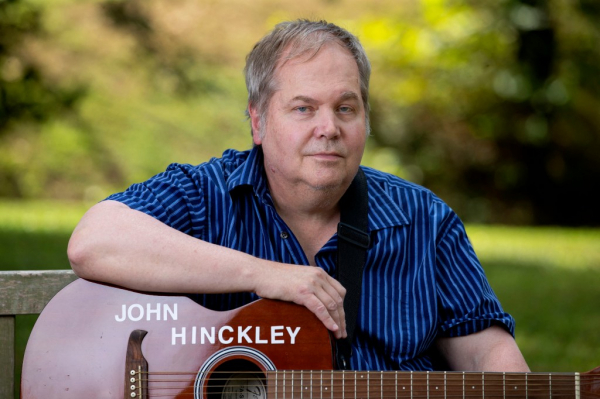
John Hinckley Jr., the Would-Be Assassin of Ronald Reagan Turned Folk Singer, Fears NYC's Crime Wave, Cancels Manhattan Performance
In a twist on the theme of "cancel culture," even John Hinckley Jr., the infamous figure who attempted to assassinate President Ronald Reagan in 1981, is now backing out of a scheduled performance in New York City. Citing concerns over the city's rising crime rates, Hinckley labeled NYC a "cesspool of crime" and expressed fear for his safety, leading to the abrupt cancellation of his upcoming gig in Manhattan.
I’m afraid of New York City and I just don’t want to go there right now," Hinckley admitted to The Post, just days after pulling the plug on his June show slated for Manhattan’s Lower East Side. The announcement of the performance had stirred up anticipation, only to be dashed by Hinckley's apprehensions about the city's safety.
The event organizers conveyed the cancellation to disappointed ticket holders in an unusual email, citing Hinckley's concerns about the city's dangerous atmosphere. According to reports by local news outlet Patch, Hinckley's decision to withdraw from the performance was met with mixed reactions, underscoring the ongoing debate surrounding safety in urban environments.
Hinckley elaborated on his decision, revealing that his fans had cautioned him against performing in NYC due to its perceived high crime rates. "They're saying, 'Don't do it, John. Because you won't be safe,'" he recounted, emphasizing the weight of public opinion on his choice.
Reflecting on his earlier aspirations to perform in the city, Hinckley acknowledged a change of heart. "If I'm going to put on a show anywhere, I want it to be safe for me and the audience," he reasoned from his home in Williamsburg, Virginia. Despite his disappointment, Hinckley remained firm in his resolve to prioritize safety above all else.
This isn't the first time Hinckley has faced setbacks due to controversy surrounding his performances. Previous cancellations, including a scrapped Connecticut show, left him feeling targeted by what he termed "cancel culture." Hinckley's experiences underscore the challenges he continues to encounter as he navigates the complexities of his public persona and the lingering shadow of his past actions.
With Hinckley's June gig canceled and uncertainty looming over future performances, the folk singer's journey remains fraught with challenges, reflecting the ongoing struggle to reconcile his past with his present aspirations.
John Hinckley Jr. Reflects on His Past and Present, Discusses Safety Concerns Amid Cancelled NYC Performance
I would have sold it out," Hinckley boasted, referring to his cancelled gig in New York City. "I sold out Market Hotel in Brooklyn in three days before they backed out. I have a pretty good fan base in the New York City area, but unfortunately, right now it’s too dangerous.
Hinckley's name became infamous after his attempted assassination of President Ronald Reagan on March 30, 1981, outside the Hilton in Washington, DC. Armed with a.22 caliber pistol, he wounded President Reagan, Secret Service agent Tim McCarthy, police officer Thomas Delahanty, and press secretary James Brady. Brady, who later became a prominent advocate for gun control, spent the remainder of his life in a wheelchair before passing away from his injuries in 2014.
The inspiration for Hinckley's heinous act stemmed from his obsession with the 1976 film "Taxi Driver" and actress Jodie Foster. He harbored delusions of impressing Foster with his assassination attempt. Found not guilty by reason of insanity, Hinckley spent over three decades in a mental hospital before being released under supervision in 2016.
Since then, Hinckley claims to have undergone a profound transformation, dedicating his time to painting and songwriting. He even entertains the idea of opening a music venue near his hometown. However, the recent cancellation of his NYC performance underscores his lingering concerns about safety.
Asked about the possibility of performing in New York City in the future, Hinckley expressed skepticism. "Well things would have to change radically and I don’t think they are. I see it as getting worse and worse," he lamented. He pointed to disturbing incidents reported in the news, including assaults on women and escalating crime rates, as evidence of the city's deteriorating conditions.
Despite his aspirations for a musical career, Hinckley remains wary of venturing into environments he perceives as unsafe, reflecting the ongoing tension between his past and present realities.
In conclusion, John Hinckley Jr.'s journey from would-be assassin to folk singer is a complex tale of redemption, scrutiny, and lingering apprehension. Despite his claims of transformation, Hinckley continues to grapple with the consequences of his past actions and the challenges of reintegrating into society. The cancellation of his NYC performance serves as a poignant reminder of the enduring impact of his infamous past and the pervasive concerns about safety that still haunt him. As Hinckley navigates the delicate balance between his newfound passions and the shadows of his past, his story serves as a compelling narrative of resilience, reflection, and the enduring quest for redemption in the face of adversity.